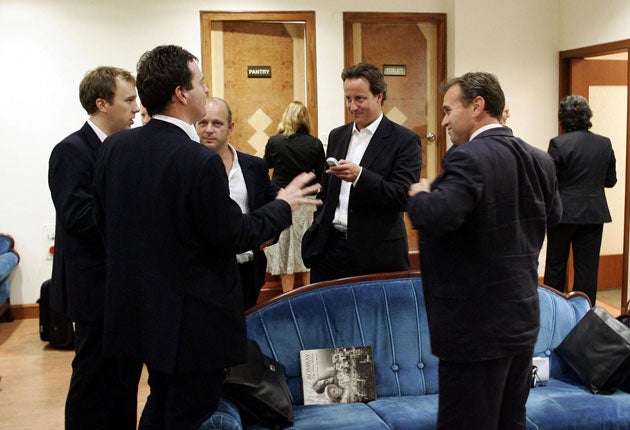Andrew Grice: The big boys fight it out while their leader sits in the middle
Inside Westminster

When George Osborne gets up, he wonders what he can do to make winning an overall Conservative majority in 2015 more likely.
When Steve Hilton gets up, he wonders what he can do to entrench permanent change in Britain now – in case David Cameron doesn't get a second term.
So they say in Downing Street. It may be a caricature of the Prime Minister's two most influential advisers but there's a lot of truth in it. Mr Hilton, the former adman, is Mr Cameron's strategy guru, on a mission to transform government through introducing transparency and devolving power. As well as being Chancellor, Mr Osborne is the Tories' election strategist, a man on a mission to win the majority he failed to deliver last year.
The two men collided spectacularly over the sweeping changes to the NHS proposed by Andrew Lansley, the Health Secretary. For Mr Hilton, they were a crucial plank in the Government's reform agenda. For Mr Osborne, they would undo Mr Cameron's painstaking work to decontaminate the Tory brand by winning the voters' trust on health.
Mr Cameron sat in the middle while his advisers slugged it out. It wasn't a fair fight. Mr Hilton was outnumbered because Mr Osborne had the support of the Liberal Democrats, who could have defeated the Health and Social Care Bill in the Commons or the Lords on the grounds that it wasn't in the Coalition Agreement signed last year. Some Cameroons even feared Nick Clegg could pull out of the Coalition and try to fight a general election on a "we saved the NHS" ticket.
The game was so one-sided that Mr Hilton found himself fighting not to preserve Mr Lansley's original proposals but to prevent the Bill being ditched completely. That was under consideration last month as Mr Hilton struggled against a powerful coalition within the Coalition of the Chancellor and the Liberal Democrats. Mr Clegg grabbed good headlines for the diluted NHS reforms. But Number 10 insiders claim Mr Osborne, although operating beneath the media radar, was more influential in ensuring the Bill was filleted. Not for the first time, Mr Cameron's heart was with Mr Hilton but his head told him to back Mr Osborne. His head won.
Mr Hilton is frustrated by the inertia of the civil service; ministers behaving like technocrats rather than politicians; European Union regulations which suffocate reform and how hard it is proving to turn his "Big Society" vision into reality. The revised Clause 1 of the NHS Bill includes a highly symbolic defeat for Mr Hilton: the Health Secretary, not the NHS Commissioning Board, will now have responsibility for promoting a comprehensive health service. It has proved much harder to devolve power than it seemed in opposition. Mr Hilton's dreams ran up against the harsh reality that a piece of legislation would not stop the public blaming politicians for problems in the NHS. People could not vote against the NHS Commissioning Board in 2015; Mr Osborne warned that they might well vote against the Tories if they felt the NHS was not safe in their hands.
Mr Hilton believes in what he is doing and there has been speculation in the wake of the NHS debate that he might flounce out of Downing Street. Although it can't be entirely ruled out because he is a volatile character, colleagues do not expect him to walk out. He may have become semi-detached three months ago but is now fully engaged in the Downing Street operation again and was firing on all cylinders this week, they say.
The big question is where the retreat on the NHS leaves the rest of the ambitious public sector reform programme set out by the Coalition last year. It reflected the rather headstrong, "there's no tomorrow and maybe no second term" approach of Mr Hilton rather than the realities of government.
Radical reformers hope the NHS U-turn is a special case because it is such a sensitive issue. But right-wing Tory MPs and business leaders worry that the watering down of competition in the NHS is a bad omen for a long-overdue White Paper on public service reform now expected next month.
It's not all gloom for the reformers. After a wobbly start, Michael Gove, the Education Secretary, is now steaming ahead as the academies programme inherited from Labour achieves critical mass. The litmus test will be whether the Government sticks to Iain Duncan Smith's shake-up of the welfare system, which is bound to provoke controversy.
True, there is more public support for "cracking down" on welfare claimants than tinkering with the NHS. However, you cannot lop £18bn off the welfare budget without creating losers. Liberal Democrats are already jittery about some proposed cuts. But this time they may find less support from Mr Osborne, who is also in charge of the most ambitious policy of all; he needs the welfare savings to reduce the deficit. As the Chancellor's display of quiet ruthlessness over the NHS showed, any obstacles to a Tory victory in 2015 will be removed.
Join our commenting forum
Join thought-provoking conversations, follow other Independent readers and see their replies
0Comments